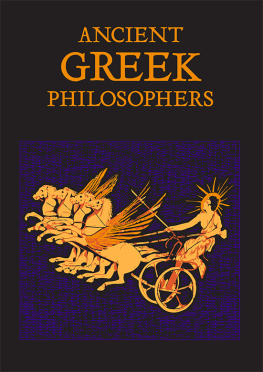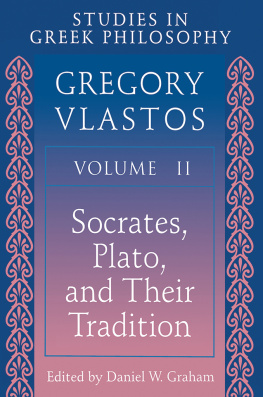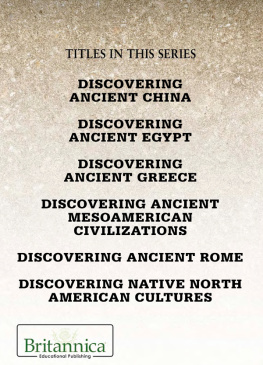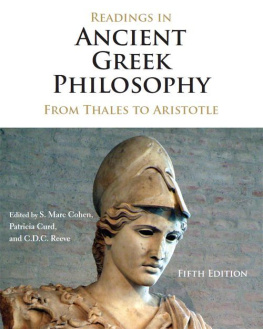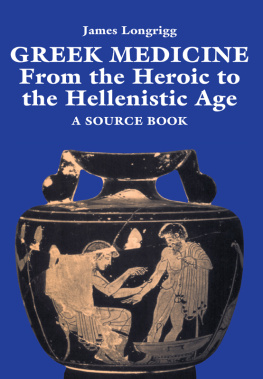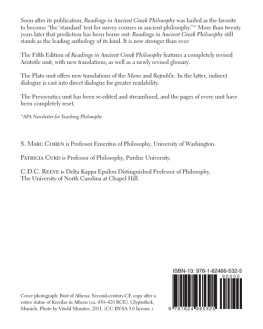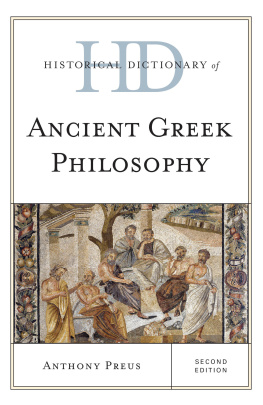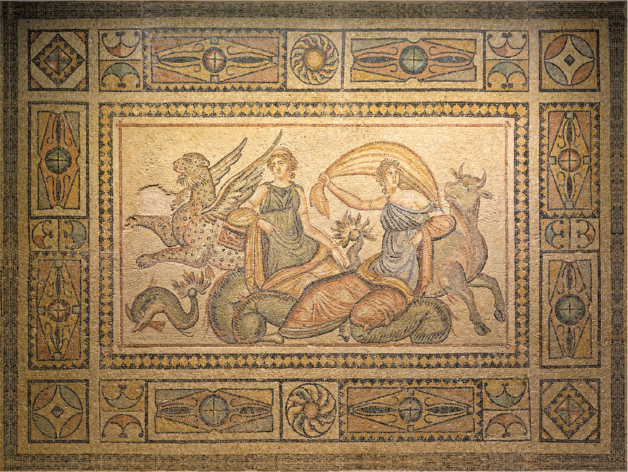ANCIENT
GREEK
PHILOSOPHERS
Introduction by Ken Mondschein, PhD

Copyright 2018 Canterbury Classics
All rights reserved. No part of this publication may be reproduced, distributed, or
transmitted in any form or by any means, including photocopying, recording, or other
electronic or mechanical methods, without the prior written permission of the publisher,
except in the case of brief quotations embodied in critical reviews and certain other
noncommercial uses permitted by copyright law.
Canterbury Classics
An imprint of Printers Row Publishing Group
10350 Barnes Canyon Road, Suite 100, San Diego, CA 92121
www.canterburyclassicsbooks.com
Printers Row Publishing Group is a division of Readerlink Distribution Services, LLC.
The Canterbury Classics name and logo are trademarks of Readerlink Distribution Services, LLC.
All correspondence concerning the content of this book should be addressed to
Canterbury Classics, Editorial Department, at the above address.
Publisher: Peter Norton
Associate Publisher: Ana Parker
Publishing/Editorial Team: April Farr, Kelly Larsen, Kathryn C. Dalby, Carrie Davis
Editorial Team: JoAnn Padgett, Melinda Allman, Dan Mansfield, Traci Douglas
Production Team: Jonathan Lopes, Rusty von Dyl
Cover design by Rusty von Dyl
Endpaper image courtesy of Dreamer Company/Shutterstock.com
Original photo that inspired cover art licensed from The British Museum
eBook ISBN: 978-1-68412-561-6
eBook Edition: July 2018
CONTENTS
when I should remember the paragons of Hellas
I think instead
Of the crooks, the adventurers, the opportunists,
The careless athletes and the fancy boys,
The hair-splitters, the pedants, the hard-boiled sceptics
And the Agora and the noise
Of the demagogues and the quacks
and lastly
I think of the slaves.
Louis MacNeice (19071963), The Gloomy Academic
T he Greek philosophical tradition not only laid the basis for Western thought but influenced the entire world. From its origins in the rocky islands and mountains of Greece, it was brought as far east as India by Alexanders conquests. When the Romans vanquished the successor states to Alexanders empire, they also absorbed the Greek philosophical tradition. The torch was passed in turn to both of Romes heirs: the Byzantine Empire and the Islamic empire. Translation into Arabic of the Greek texts began in the eighth century CE during the Abbasid caliphate, especially in the famous House of Wisdom founded in Baghdad by the Caliph Harun al-Rashid in the late eighth century.
Beginning in the twelfth century, the works of Greek philosophy that had been lost in the West, especially those of Aristotle, were transmitted to medieval Europe by means of translations from Arabic into Latin, the common language of European scholars. Multilingual border areas, such as Sicily and Spain, were especially important in this effort. By the next century, a few brilliant scholars such as Robert Grosseteste had begun making translations into Latin directly from the Greek. Together with the Arabic translations came a rich tradition of commentaries, which medieval European writers added to as they sought to reconcile faith with reason. In an age of sectarian strife among Christians, Muslims, and Jews, Greek philosophy provided common ground on which scholars of different faiths could work together.
Though translations of Greek philosophy into European vernacularseveryday languages such as English, Italian, and French, as opposed to scholarly Latinprobably existed from the earliest times, many important translations were produced in the late Middle Ages as powerful patrons hungered for education and practical advice for ruling. The Parisian philosopher Nicole Oresme (c. 13201385), for instance, produced French translations and commentaries of Aristotles Ethics, Politics, and On the Heavens, as well as a work on economics incorrectly attributed to the philosopher, for King Charles V of France. The pace of translation increased during the Renaissance as Italian scholars sought to recover the wisdom of the ancient world and a passion for Plato swept over the peninsula. The elite of Italy, such as Cosimo de Medici (13891464), would patronize scholars, such as Marsilio Ficino (14331499), and fund the revival of Platonic thought, which, they thought, would give them a truer understanding of God. The invention of print only increased the pace, and publishers found that editions of philosophers in Greek, Latin, and vernacular languages were a good way to turn a profit.
As part of the millennia-old tradition of translation and publication, Ancient Greek Philosophers providesin convenient forma prcis of selected aspects of Greek philosophy. Though it contains works from several authors, it is but a toe dipped into a vast pool of thought. This introduction is not only a history and contextualization of these works, but also a brief explanation of the ideas found therein. It also takes into account some of the ways in which Greek thought not only influenced later philosophy, but also politics, literature, and art. Finally, it looks at the lives of some of the men and women who undertook the work of translating these works into English.
ORIGINS OF GREEK PHILOSOPHY
Philosophy, from the Greek , philosophia, literally means love of wisdom. At its core, it is nothing less than a critical, reasoned examination of the fundamental problems of existencehow we can be moral, how (and whether) we can know things for certain, and how we can live our best lives. However, its activities go well beyond this aim. Historically, philosophy meant a body of knowledge; thus, natural philosophy is an older term for what today we call science. For the ancients, however, there was no hard-and-fast distinction between the fields of math, physiology, spiritualism, and other disciplines.
Philosophy is deeply rooted in the social conditions of ancient Athens. The Athenian democratic tradition required citizens (who were free men born in the city) to be their own lawyers, advocates, and representatives in the ecclesia, or popular assembly. To be able to speak well in public was thus an important skill for the free Athenian. Equally important was personal martial and athletic ability: To be a free citizen was to serve as a hoplite, or citizen-soldier, in the city militia. Hoplites were armed with shields and spears and fought shoulder-to-shoulder in a formation called a phalanx. Each man was protected not just by his own shield, but by the shield of the man to his right as the two sides came together in a clash called the othismos, or push. The side that broke first would run and often be chased down and slaughtered. Battle tactics thus required virtues such as cooperation, patriotism, group cohesion, sacrificing oneself for the good of the whole, and personal toughness, while civil life required the ability to debate, manage public opinion, and maneuver in a shifting and fractious political environment. It is no coincidence that these are virtues valued by Greek philosophy.
Athens in the years after the Persian Wars (499449 BCE) was, much like the United States after World War II, a society in its golden age. Money from the Delian League, Athens de facto empire, poured into the city. Athens was rebuilt in grand style from the wars devastation. It was in this environment that the sophists thrivedwe could better translate the name as wise guys than lovers of wisdom. These men claimed they could prove any argument or solve any problem for a fee; the term sophist has become considered derogatory, since writers who followed Socrates (470399 BCE) fancied themselves in the true, elevated philosophical tradition and dismissed these early thinkers as amoral, hair-splitting mercenaries.

